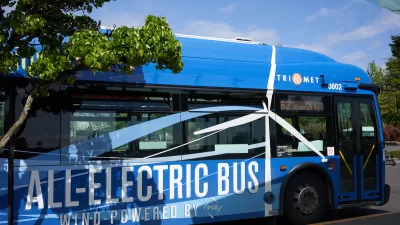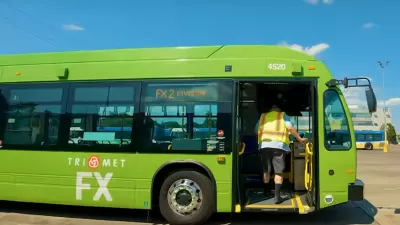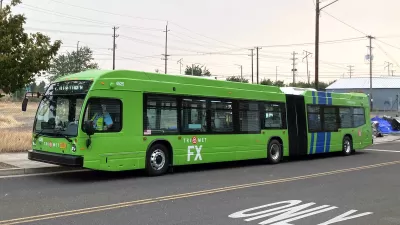The same issues afflicting transit agencies across the country, the perfect storm of declining funding and rising costs, are conspiring to challenge Portland's leadership in transit innovation and adoption, reports Ryan Holeywell.
While solutions to expected budget gaps in the coming years have yet to be adopted, it is likely that increased fares and reduced service will impact Portland's transit users beginning next year. And ominously, budget challenges will mean the, "likely end of the Free Rail Zone, an innovative program that provides no-cost rides in the center of the city and has come to symbolize the region's commitment to easily accessible transit service," writes Holeywell.
For a city that is proud of its ability to "outbox our weight class" in terms of its public transportation leadership, the expected cuts could have a long term impact. According to Holeywell, "To solve the problem next year, TriMet has proposed fare increases -- by nearly 20 percent in some cases -- as well as eliminating the Free Rail Zone program, cutting bus service and reducing the frequency of light rail trains. When you take any of those steps, [Neil] McFarlane [head of the regional transit agency] acknowledges, 'You're messing with people's lives.'"
In addition to the challenges facing the operation of the system already in place, some are questioning whether massive expansion plans are prudent in such a fiscal environment, and whether the same motives driving public officials to succeed will end up causing their failure.
"[John] Charles [president and CEO of the Cascade Policy Institute] and many other skeptics believe the current push is driven largely by local leaders' desire to continue receiving national accolades for their commitment to rail. Indeed, when U.S. News & World Report ranked Portland the No. 1 city in America for transit last year, TriMet tooted its horn by plastering ads highlighting the ranking on its vehicles. (The agency had to pull them when the publication revised its rankings due to problems with its methodology.)"
FULL STORY: Portland Struggles to Remain a Leader in Public Transit

Alabama: Trump Terminates Settlements for Black Communities Harmed By Raw Sewage
Trump deemed the landmark civil rights agreement “illegal DEI and environmental justice policy.”

Planetizen Federal Action Tracker
A weekly monitor of how Trump’s orders and actions are impacting planners and planning in America.

The 120 Year Old Tiny Home Villages That Sheltered San Francisco’s Earthquake Refugees
More than a century ago, San Francisco mobilized to house thousands of residents displaced by the 1906 earthquake. Could their strategy offer a model for the present?

In Both Crashes and Crime, Public Transportation is Far Safer than Driving
Contrary to popular assumptions, public transportation has far lower crash and crime rates than automobile travel. For safer communities, improve and encourage transit travel.

Report: Zoning Reforms Should Complement Nashville’s Ambitious Transit Plan
Without reform, restrictive zoning codes will limit the impact of the city’s planned transit expansion and could exclude some of the residents who depend on transit the most.

Judge Orders Release of Frozen IRA, IIJA Funding
The decision is a victory for environmental groups who charged that freezing funds for critical infrastructure and disaster response programs caused “real and irreparable harm” to communities.
Urban Design for Planners 1: Software Tools
This six-course series explores essential urban design concepts using open source software and equips planners with the tools they need to participate fully in the urban design process.
Planning for Universal Design
Learn the tools for implementing Universal Design in planning regulations.
Clanton & Associates, Inc.
Jessamine County Fiscal Court
Institute for Housing and Urban Development Studies (IHS)
City of Grandview
Harvard GSD Executive Education
Toledo-Lucas County Plan Commissions
Salt Lake City
NYU Wagner Graduate School of Public Service





























